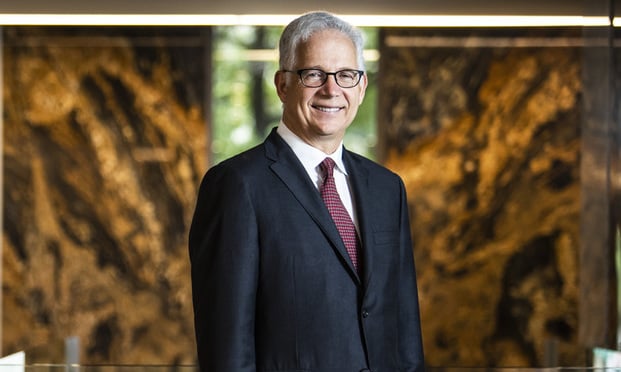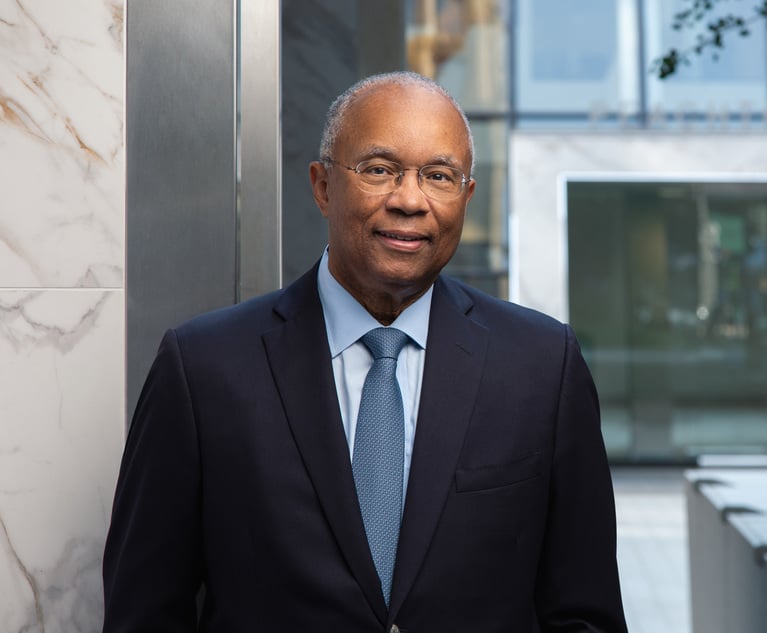Sanford on Major Litigation and #MeToo
David Sanford and Jeremy Heisler founded Sanford Heisler Sharp in 2004. Since then, the firm has reached major settlements.
April 30, 2019 at 11:59 PM
7 minute read
 David Sanford, Chairman and co-founder of Sanford Heisler Sharp. October 5, 2018.
David Sanford, Chairman and co-founder of Sanford Heisler Sharp. October 5, 2018.
David Sanford and Jeremy Heisler founded Sanford Heisler Sharp in 2004. Since then, the firm has reached major settlements with big companies, law firms and government institutions with class actions and other litigation. Since the #MeToo movement put a spotlight on sexual harassment and gender discrimination, Sanford, the firm's chairman, says inquiries have swelled. Sanford spoke recently with The National Law Journal. The interview was edited for length and clarity.
Tell us about the legal landscape in the areas where you practice. I think right now we are in a very different place. In October 2017, the news broke regarding Harvey Weinstein that gave rise to the #MeToo social media campaign. It pushed us to reflect on where we are in society in respect to gender relations in general and sexual assault in particular. As a result of that social media campaign, and subsequent high-profile cases involving celebrities, there has been an increase [both] in the level of interest in these matters and in the sheer number of people who have contacted our firm. For example, in September 2017, approximately 2,000 people contacted [our] firm. In 2018, the number doubled. We take about 100 cases a year. In 2017, we took 5 percent and in 2018, we only took 2.5 percent. The number accepted [was] the same but [the] intake doubled. It's very interesting. In terms of the state of this area of law, there is a willingness of people to come forward and tell their stories. There is just a lot more work to do.
How do you go about choosing which cases to take with such volume? It's always a challenge. I review all the intakes done by the legal assistants nationwide. The cases we take have to fit in our social-justice-mission-driven firm. They have to fit within the context of social justice and the law. We look at the individual. We make a judgment about credibility in assessing the client. We have to evaluate whether the client is likable and believable. If the jury will like and believe, it's more likely we'll win. If neither is true, it will be a more difficult challenge. We evaluate the strength of the documents and any witnesses who might be willing to speak. We do our homework on the front end [so] that we have a good shot at the back end at trial.
When you choose cases, are you looking to tackle broader systemic problems, as well as reach settlements for individuals? We are always looking to bring [in] cases on the cutting edge that can move the needle from a legal perspective and challenge existing frameworks. That's our opportunity to create change. Cases that may be cases of first impression that are fascinating and should be brought in order to challenge the law further. We are always looking for those kinds of matters. We have cases of great social import for the entire country, including surrounding the opioid epidemic and the U.S. Marshall's Service. We have cases in the university context, involving Dartmouth, NYU and Columbia. We take on Equal Pay Act cases. The cases we bring are challenging. They are difficult and take time, but they are socially valuable and we believe we are on the right side of the law and we look for issues where there isn't moral ambiguity.
What are some of the highlights in recent years? There were a number of significant settlements. We have had some high-profile cases against law firms. We have had cases we settled and others we are litigating [MoFo, Jones Day, Ogletree]. We represent Am Law 100 partners throughout the United States in presuit negotiations involving Title VII and discrimination claims right now.
Have pay and promotion claims been one of the central focuses of these cases? There are multiple claims out there, and pay and promotion claims often go with the territory. We have a pay gap for female equity partners in this country. Male partners on average make $950,000 a year and female partners make $650,000 a year. The pay gap is a lot worse in Big Law than on average in the rest of the country. We see that pay gap and we see the issues of rising in the ranks to equity partner for women. These issues include individualized retaliation and hostile work environment claims.
Can you discuss the issues involved with these female partners filing such claims at law firms? There is an initial threshold we have to deal with. In order to avail yourself of rights under the Equal Pay Act, you have to be an employee. There is an argument that partners are not employees, they are owners. That's an issue at the outset. A U.S. Supreme Court case lays out a six-factor test whether business owners are truly business owners for the purposes of the statute. The test goes to the issue of power and control. Do you have the power to hire and fire? Do you have the power to enter into contracts for the firm? Do you have autonomy in day-to-day life? Are you involved in the profits and losses?
The Supreme Court said there is no bright-line test in the totality of the circumstances. When we apply to the law firms what we know about, it's pretty clear to us they aren't true business owners. There are only a few that make fundamental decisions in the firm. Everyone else is an employee. That's an initial legal issue we have to overcome in order to pursue claims.
The #MeToo movement has put a spotlight on gender equality. Has it helped you in your cases? There has been a focus on the treatment of women, in the employment context or not. That's a good thing. We are only a year and a half into the #MeToo movement. We will know more about [the] impact on the law, especially with verdicts, in the next five years. I think it's too early to tell. It's certainly true there's more comment and writing and thought given to the issue. Because of the attention to the issues, it's more likely that juries will be mindful of the background and societal issues and consider the entire context when they are in the jury room.
Can you discuss how mandatory arbitration has evolved in Big Law and other contexts? I recently told students at Harvard Law School when they asked what they could do that they should think about banding together and potentially asking questions about mandatory arbitration in the context of Big Law. [T]hey have options. I encourage them to exercise those options and ask the hard questions. Students indicated a desire to ask hard questions and essentially take a hard look at any firm with a mandatory arbitration agreement. Perhaps raising questions and making decisions around that will make it more likely that law firms will change the mandatory arbitration process.
Erin Mulvaney covers labor and employment issues from the Swamp to Silicon Valley. She's a Texas native based in Washington, D.C. Contact her on Twitter: @erinmulvaney
This content has been archived. It is available through our partners, LexisNexis® and Bloomberg Law.
To view this content, please continue to their sites.
Not a Lexis Subscriber?
Subscribe Now
Not a Bloomberg Law Subscriber?
Subscribe Now
NOT FOR REPRINT
© 2025 ALM Global, LLC, All Rights Reserved. Request academic re-use from www.copyright.com. All other uses, submit a request to [email protected]. For more information visit Asset & Logo Licensing.
You Might Like
View All
US Patent Innovators Can Look to International Trade Commission Enforcement for Protection, IP Lawyers Say

Zuckerman Spaeder Gets Ready to Move Offices in DC, Deploy AI Tools in 2025
5 minute read
Outgoing USPTO Director Kathi Vidal: ‘We All Want the Country to Be in a Better Place’
19 minute read
Ex-Deputy AG Trusts U.S. Legal System To Pull Country Through Times of Duress
7 minute readTrending Stories
- 1Silk Road Founder Ross Ulbricht Has New York Sentence Pardoned by Trump
- 2Settlement Allows Spouses of U.S. Citizens to Reopen Removal Proceedings
- 3CFPB Resolves Flurry of Enforcement Actions in Biden's Final Week
- 4Judge Orders SoCal Edison to Preserve Evidence Relating to Los Angeles Wildfires
- 5Legal Community Luminaries Honored at New York State Bar Association’s Annual Meeting
Who Got The Work
J. Brugh Lower of Gibbons has entered an appearance for industrial equipment supplier Devco Corporation in a pending trademark infringement lawsuit. The suit, accusing the defendant of selling knock-off Graco products, was filed Dec. 18 in New Jersey District Court by Rivkin Radler on behalf of Graco Inc. and Graco Minnesota. The case, assigned to U.S. District Judge Zahid N. Quraishi, is 3:24-cv-11294, Graco Inc. et al v. Devco Corporation.
Who Got The Work
Rebecca Maller-Stein and Kent A. Yalowitz of Arnold & Porter Kaye Scholer have entered their appearances for Hanaco Venture Capital and its executives, Lior Prosor and David Frankel, in a pending securities lawsuit. The action, filed on Dec. 24 in New York Southern District Court by Zell, Aron & Co. on behalf of Goldeneye Advisors, accuses the defendants of negligently and fraudulently managing the plaintiff's $1 million investment. The case, assigned to U.S. District Judge Vernon S. Broderick, is 1:24-cv-09918, Goldeneye Advisors, LLC v. Hanaco Venture Capital, Ltd. et al.
Who Got The Work
Attorneys from A&O Shearman has stepped in as defense counsel for Toronto-Dominion Bank and other defendants in a pending securities class action. The suit, filed Dec. 11 in New York Southern District Court by Bleichmar Fonti & Auld, accuses the defendants of concealing the bank's 'pervasive' deficiencies in regards to its compliance with the Bank Secrecy Act and the quality of its anti-money laundering controls. The case, assigned to U.S. District Judge Arun Subramanian, is 1:24-cv-09445, Gonzalez v. The Toronto-Dominion Bank et al.
Who Got The Work
Crown Castle International, a Pennsylvania company providing shared communications infrastructure, has turned to Luke D. Wolf of Gordon Rees Scully Mansukhani to fend off a pending breach-of-contract lawsuit. The court action, filed Nov. 25 in Michigan Eastern District Court by Hooper Hathaway PC on behalf of The Town Residences LLC, accuses Crown Castle of failing to transfer approximately $30,000 in utility payments from T-Mobile in breach of a roof-top lease and assignment agreement. The case, assigned to U.S. District Judge Susan K. Declercq, is 2:24-cv-13131, The Town Residences LLC v. T-Mobile US, Inc. et al.
Who Got The Work
Wilfred P. Coronato and Daniel M. Schwartz of McCarter & English have stepped in as defense counsel to Electrolux Home Products Inc. in a pending product liability lawsuit. The court action, filed Nov. 26 in New York Eastern District Court by Poulos Lopiccolo PC and Nagel Rice LLP on behalf of David Stern, alleges that the defendant's refrigerators’ drawers and shelving repeatedly break and fall apart within months after purchase. The case, assigned to U.S. District Judge Joan M. Azrack, is 2:24-cv-08204, Stern v. Electrolux Home Products, Inc.
Featured Firms
Law Offices of Gary Martin Hays & Associates, P.C.
(470) 294-1674
Law Offices of Mark E. Salomone
(857) 444-6468
Smith & Hassler
(713) 739-1250










